
GEOLOGICA ACTA
Scope & Guideline
Shaping the future of geology with impactful research.
Introduction
Aims and Scopes
- Geological Processes and Tectonics:
Research exploring the fundamental processes driving tectonic movements, including faulting, sedimentation, and metamorphism across various geological settings. - Geochemistry and Petrology:
Investigations into the chemical composition and mineralogical characteristics of rocks, aiming to understand their formation, evolution, and the geodynamic processes involved. - Paleoenvironmental and Paleoclimatic Studies:
Studies that reconstruct past environments and climates through sediment analysis, fossil records, and isotopic studies to comprehend historical geological events. - Stratigraphy and Sedimentology:
Research focusing on sedimentary processes, stratigraphic relationships, and depositional environments, contributing to the understanding of geological history. - Hydrogeology and Reactive Transport Modeling:
Studies that examine groundwater flow, contaminant transport, and the interactions between geological materials and fluids, often using advanced modeling techniques. - Geological Hazards and Seismology:
Research addressing the assessment and understanding of geological hazards such as earthquakes and volcanic activity, including their implications for society.
Trending and Emerging
- Digital Modeling and Computational Geology:
There is a rising emphasis on digital modeling techniques, including the use of MATLAB for developing rock models, indicating a shift towards integrating computational methods in geological research. - Geochemical and Isotopic Studies:
An increasing number of publications focus on detailed geochemical analyses and isotopic studies, particularly in understanding the origins and processes of various rock types and mineral deposits. - Tectonic and Structural Geology:
Research related to tectonic processes, structural controls, and landscape evolution is trending, reflecting a growing interest in understanding the interplay between geological structures and surface processes. - Hydrothermal Systems and Mineral Deposits:
Emerging studies on hydrothermal systems, particularly in relation to mineral deposits, highlight the importance of understanding fluid interactions and their geological implications. - Integrated Geoscience Approaches:
There is a noticeable trend towards interdisciplinary studies that integrate various geological disciplines, enhancing the understanding of complex geological systems.
Declining or Waning
- Paleobiology and Fossil Records:
There has been a noticeable decrease in studies focused on paleobiology, particularly concerning fossil documentation and analysis, suggesting a shift towards more geochemical and petrological themes. - Marine Geology:
Research specifically targeting marine geological processes and sedimentation has become less prominent, possibly reflecting a broader trend towards terrestrial geological studies. - Geological Mapping and Field Studies:
Traditional geological mapping and fieldwork studies are less frequently published, indicating a possible transition to more analytical and computational approaches in geological research.
Similar Journals
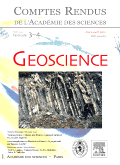
COMPTES RENDUS GEOSCIENCE
Innovating Insights into Planetary Change.COMPTES RENDUS GEOSCIENCE, an esteemed open-access journal published by ACAD SCIENCES since 2020, serves as a vital platform for disseminating significant research in the field of Earth and Planetary Sciences. With an ISSN of 1631-0713 and E-ISSN of 1778-7025, this French journal is located at 23 Quai de Conti, Paris, 75006, France. Focusing on various sub-disciplines, it is recognized in the 2023 category quartiles as Q2 in Earth and Planetary Sciences (miscellaneous) and Q3 in Global and Planetary Change. The journal ranks #82 out of 195 in Earth and Planetary Sciences and #79 out of 120 in Environmental Science, reflecting its commitment to quality scholarship and impactful research. The journal's open-access model enhances accessibility, ensuring that researchers, professionals, and students alike can freely engage with cutting-edge findings that contribute to a deeper understanding of our planet and its systems. The ongoing convergence of knowledge from 2002 to 2024 positions COMPTES RENDUS GEOSCIENCE as a crucial resource in the evolving landscape of geosciences.

STRATIGRAPHY AND GEOLOGICAL CORRELATION
Bridging Time and Space in Geological ResearchSTRATIGRAPHY AND GEOLOGICAL CORRELATION is a prominent scholarly journal published by PLEIADES PUBLISHING INC, featuring a dedicated focus on the fields of geology, stratigraphy, and paleontology. With ISSN 0869-5938 and E-ISSN 1555-6263, this journal has been disseminating significant research findings since its inception in 1994, continuously contributing to the academic discourse through 2024. Despite not currently offering open access, its relevance is underscored by its Category Quartiles for 2023, where it has established itself as Q3 in Geology and Paleontology, and Q2 in Stratigraphy. STRATIGRAPHY AND GEOLOGICAL CORRELATION ranks #29 out of 55 in Stratigraphy and #186 out of 321 in Geology according to Scopus metrics, positioning it within the competitive landscape of Earth and Planetary Sciences. Researchers, professionals, and students are invited to engage with the journal’s content to deepen their understanding and foster innovation within these critical areas of study.
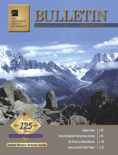
GEOLOGICAL SOCIETY OF AMERICA BULLETIN
Innovative Research Shaping the Geosciences LandscapeThe Geological Society of America Bulletin (GSA Bulletin), with ISSN 0016-7606 and E-ISSN 1943-2674, is a premier scholarly journal published by Geological Society of America, Inc. Based in the United States, this journal has been a cornerstone of geological research since its inception in 1890, making significant contributions to the understanding of Earth sciences over more than a century. Recognized for its rigorous peer-review process, the GSA Bulletin currently holds a prestigious Q1 ranking in Geology, positioning it among the top 14 journals in Earth and Planetary Sciences in terms of Scopus ranking, reflecting the high quality and impact of the research it publishes. Researchers, professionals, and students alike benefit from its comprehensive coverage of geological topics, including sedimentology, volcanology, and paleontology, which supports the advancement of knowledge in the geosciences. While the journal is not open access, it continues to provide a vital platform for innovative research and critical discussions that shape the future of geology.
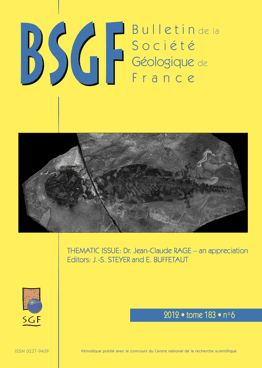
BSGF-Earth Sciences Bulletin
Pioneering Research in Earth and Planetary SciencesWelcome to the BSGF-Earth Sciences Bulletin, a premier open-access journal published by EDP SCIENCES S A that has been illuminating the field of earth sciences since its inception. With an ISSN of 0037-9409 and an E-ISSN of 1777-5817, this journal has established itself as a vital platform for disseminating significant research findings and innovative studies in Earth and Planetary Sciences. Operating out of France, BSGF is recognized for its rigorous peer-review process and its commitment to accessibility, having transitioned to open access in 2018. This stature is reflected in its outstanding rankings, placing it in the Q1 quartile within both Earth and Planetary Sciences and Geology disciplines, and ranking #35/195 overall in the Scopus database. Researchers, professionals, and students alike will find the BSGF invaluable for its high-impact articles, which span a wide array of sub-disciplines, addressing both foundational concepts and contemporary challenges in earth sciences.

Swiss Journal of Geosciences
Connecting Researchers to the Heart of Earth ScienceSwiss Journal of Geosciences is a prestigious academic journal dedicated to advancing the field of geosciences, published by SPRINGER INTERNATIONAL PUBLISHING AG. Since its inception in 2007, the journal has established itself as a leading platform for disseminating high-quality research findings in various domains related to Earth and planetary sciences, achieving a notable Q1 ranking in Geology as of 2023. With a solid reputation reflected in its Scopus ranking of Rank #72/321, the journal stands in the 77th percentile within its category. Based in Switzerland, the Swiss Journal of Geosciences embraces an open access model, making it easier for researchers, professionals, and students worldwide to access vital geological research without barriers. The journal’s objectives include promoting interdisciplinary research and fostering insights that address both fundamental and applied geoscientific problems, ensuring it remains a crucial resource for those seeking to understand our planet’s dynamics. Engage with pioneering research and contribute to the vibrant community of geoscientists by exploring the impactful articles published within its pages.
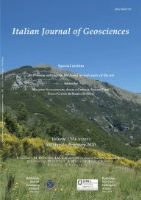
Italian Journal of Geosciences
Empowering Inquiry: Your Source for Geoscientific ExcellenceItalian Journal of Geosciences, published by the Società Geologica Italiana, is a distinguished platform for the dissemination of research in the fields of Earth and Planetary Sciences and Geology. With an impressive impact factor reflected in its 2023 rankings, where it placed in the Q3 category across its related fields, this journal serves as a vital resource for academics, practitioners, and students. Established in 2010 and poised to continue until 2024, the journal showcases critical advancements and interdisciplinary studies that deepen our understanding of geological processes and Earth systems. Operating under open access options, it offers robust accessibility to a broad audience, facilitating wider dissemination of knowledge. The journal's affiliation with Università degli Studi La Sapienza in Rome, Italy, further underscores its commitment to academic excellence and innovation in geosciences.

Russian Journal of Pacific Geology
Charting New Territories in Geological ResearchThe Russian Journal of Pacific Geology is a pivotal resource in the realm of Earth sciences, published by PLEIADES PUBLISHING INC. With an ISSN of 1819-7140 and an E-ISSN of 1819-7159, this journal has established itself as a significant publication for researchers, professionals, and students who explore the intricate geology of the Pacific region. Covering a wide array of topics including Geochemistry, Petrology, Geology, Geophysics, Oceanography, Paleontology, and Stratigraphy, the journal's relevance is underscored by its categorization within Q3 quartile rankings across multiple disciplines in the 2023 metrics. Operating from the United States, its influential publications span from 2007 to 2024, attracting a diverse audience dedicated to advancing the geological sciences. Although not an open access journal, it serves as a valuable repository of knowledge, presenting original research, reviews, and critical discussions that enhance scholarly discourse. The journal is recognized within the global scientific community, addressing significant geological challenges while fostering collaboration and innovation among scholars in the Earth and Planetary Sciences.
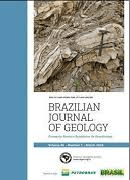
Brazilian Journal of Geology
Fostering Excellence in Geoscientific ResearchBrazilian Journal of Geology, the flagship publication of the SOC BRASILEIRA GEOLOGIA, has been a beacon of geoscientific research since its inception in 2013. With an ISSN of 2317-4889 and an E-ISSN of 2317-4692, this open-access journal has facilitated the dissemination of high-quality research across various branches of geosciences, making it freely accessible to a global audience since 2014. Hailing from Brazil, the journal proudly holds a Q2 ranking in Earth and Planetary Sciences as of 2023, and ranks #73 out of 195 in Scopus, indicating its growing impact and relevance in the field. The Brazilian Journal of Geology aims to bridge diverse geological studies with interdisciplinary approaches, promoting the understanding and application of geology in addressing contemporary scientific challenges. As it converges research from 2013 to 2024, the journal not only enriches the academic landscape but also serves as a vital resource for researchers, professionals, and students eager to explore the complexities of the Earth and its processes.

ANNALES SOCIETATIS GEOLOGORUM POLONIAE
Illuminating the Depths of Earth Sciences.ANNALES SOCIETATIS GEOLOGORUM POLONIAE is a distinguished journal published by the Polish Geological Society, focusing on pivotal research in the fields of geology, economic geology, and stratigraphy. With an ISSN of 0208-9068, this journal has established itself as an essential platform for disseminating significant findings and advancements in geological sciences since its convergence in 2008. The journal proudly holds a Q2 quartile ranking in the categories of Economic Geology, Geology, and Stratigraphy as of 2023, indicating its respectable position within the global academic community. Researchers will find its indexed status in Scopus, ranking #138/321 in Geology and showcasing a solid presence in key geological sub-disciplines. While the journal is not open access, it remains a vital resource for professionals and students striving for insight into contemporary geological research. Located in Krakow, Poland, the journal continues to contribute significantly to the understanding of geological processes and resources, making it an indispensable reference for anyone in the field.
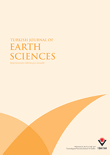
TURKISH JOURNAL OF EARTH SCIENCES
Shaping the Future of Geological ResearchTURKISH JOURNAL OF EARTH SCIENCES, published by the Tubitak Scientific & Technological Research Council Turkey, is a premier platform dedicated to advancing the field of Earth and Planetary Sciences. With an ISSN of 1300-0985, this journal has been a significant contributor to the international scientific community since its inception in 2002, and is set to continue publishing groundbreaking research through 2024. As a recognized journal in the Q2 quartile of Earth and Planetary Sciences, it ranks #98 out of 195 in its category according to Scopus metrics, positioning it within the 50th percentile of its field. The journal emphasizes peer-reviewed research, providing invaluable insights that facilitate scholarly discourse and promote rigorous investigation into various aspects of the Earth sciences. Although it does not currently offer open access, the journal remains a vital resource for academics, professionals, and students seeking to deepen their understanding of geological phenomena and contribute to the advancement of this essential discipline.